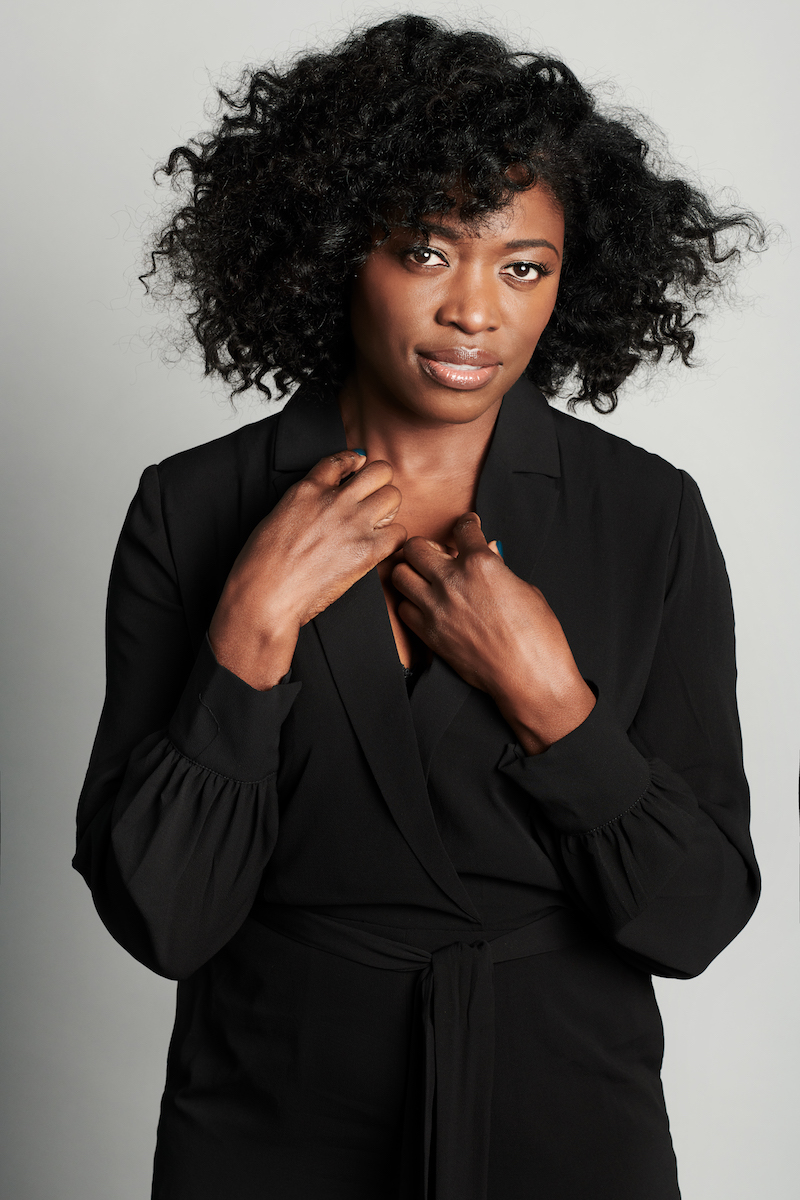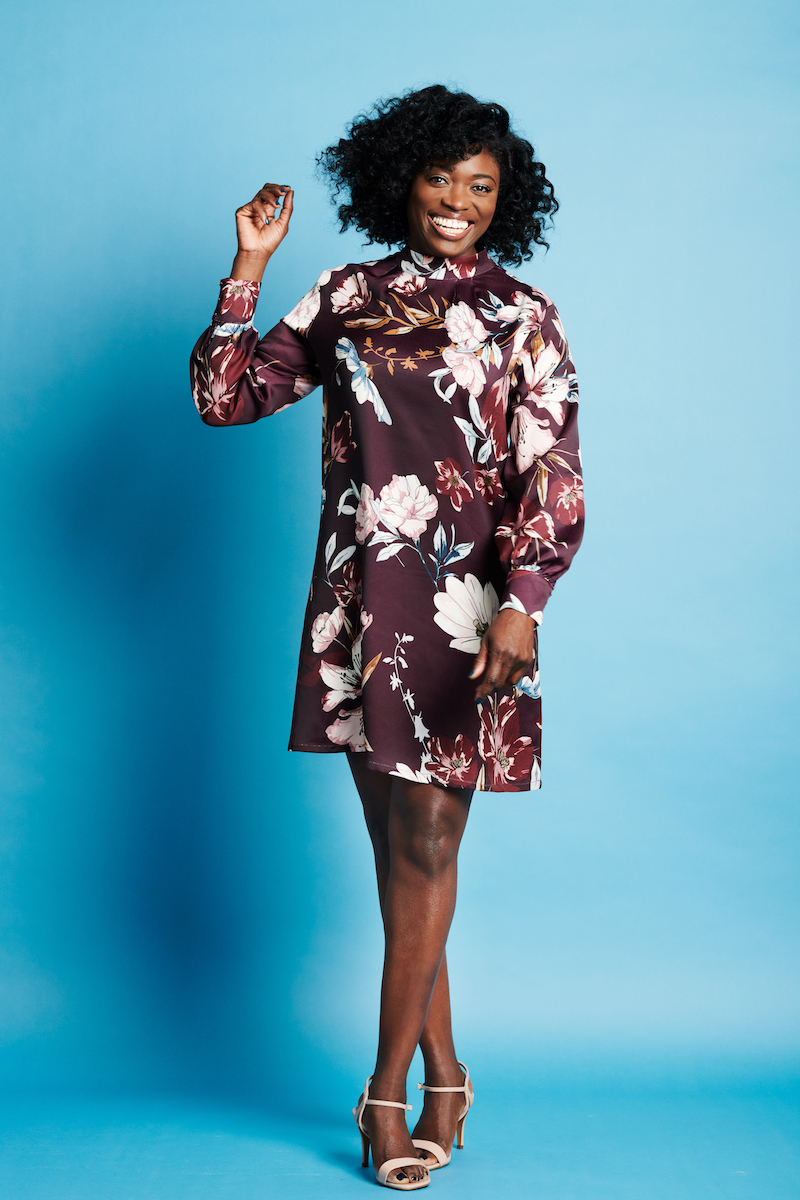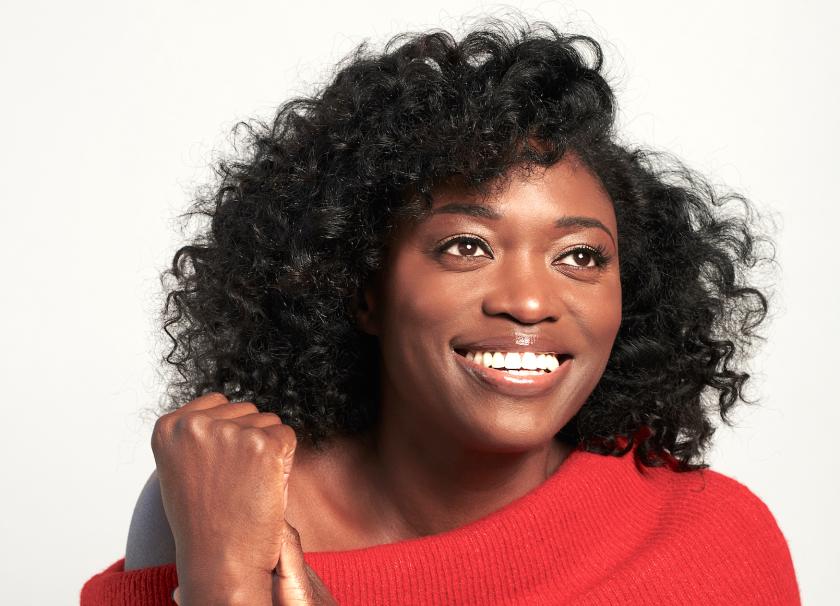In her 15-year career, Plaistow-born Andi Osho has worked in theatre, TV and stand-up, and is the only contestant to have won Celebrity Mastermind twice. Highlights of her astonishingly varied CV include appearances in Casualty, Waking the Dead, EastEnders and Death in Paradise, and she played therapist Carrie in Michaela Coel’s acclaimed I May Destroy You. She co-hosted Channel 4’s Tonightly, was a regular on Stand Up for the Week, and was a presenter on Supershoppers. Now 48, Osho has just published her debut novel, romantic comedy Asking For A Friend.
LAURA DE LISLE: Congratulations on your debut novel, Asking For A Friend. Can you tell me a bit about the story?
ANDI OSHO: Thank you! It’s about three girlfriends who are kind of stuck when it comes to relationships, for different reasons. They decide to come together and ask guys out in person, but they do it for each other. It doesn’t quite work out, basically. The story is very much about friendship: these three women are central to the whole thing. It’s not just about the people they meet in their romantic lives – it’s about their relationship with each other as much as the intimate relationships that they may or may not end up with.
You’re an experienced writer, but was this your first foray into novel-writing?
Totally. I’ve done a lot of screenwriting and tweaked other people’s scripts, and a little bit of journalism, but nothing like this. It was like a whole new world: what the business of fiction is, but also the process of writing. I found myself in this position where I was having to learn what I’d agreed to do while I was doing it.
Do you think the pandemic made it easier or harder to write Asking For A Friend?
Well, I wrote it before the pandemic, but I am writing another one at the moment. What’s tricky for me is two things: balancing all the other things that I do – the writing, and I’ve got a podcast, and all kinds of different things. The writing takes a different headspace. The other thing is – and I’m sure a lot of people found this – the first lockdown was unambiguous. It was like, "everybody stay at home unless", whereas the second two were a bit more flexible, or subject to interpretation. I’ve found myself in this middle ground: work offers and auditions were coming in, but they were moving around a lot because of COVID protocols. It was tricky trying to balance everything, those second two lockdowns. I can be quite a binary person, so I like the "everyone stay at home, don’t move until we say so" sort of thing. I understand that.
You mentioned your podcast, Creative Sauce. How did that get started?
Where it started was me wanting to find video content that spoke specifically about creativity. Maybe I was looking in the wrong places, but I didn’t find what I was looking for – I found short videos, but not long-form. So I started doing it myself, referencing my experience in the industry, and I started streaming on Instagram Live. I’d do it every Sunday, on and off, and a crowd started to grow. I did that for a year and a bit, so I ended up with 52 hour-long conversations. I thought, "I could take that audio and turn it into a podcast, but I think it would be of more use to people if I just start again". I’ve really enjoyed doing it, because I get something from it as well. It’s easy for someone to say "you can look at rejection like this", but if I’m not applying it, it’s kind of rubbish.
In the second episode, you reference a quote from Bradley Cooper, about how he took 15 years to learn how to not act. Why did that resonate with you?
When I started acting, because I didn’t go down the formal road of drama school, I had to learn on the job. I had chronic imposter syndrome for a really long time, because I didn’t completely understand what inhabiting a character meant. For a while, I thought it was just mimicry, and reproducing what you’d been told to. I thought a director would say "do this" and then you would do it, rather than it being a creative expression of the actor’s choice. In the early days, I was laying it on really thick, and so that only allowed me to get a certain way in terms of the jobs I was being seen for, because my characters weren’t real. An acting coach I had called it "indicating": you’re trying to let the audience know what emotion you’re trying to show, rather than just being in it. How what Bradley Cooper said landed with me is that we don’t do that in normal life. As human beings, we don’t try and emit sadness; we’re either sad or we’re not. It gets expressed in so many different ways. Allowing yourself to express the character as you would, and in an authentic way, takes a really long time of trusting yourself as a performer to let go of all those tricks and trappings, bad habits you may pick up or bring with you when you first start acting, and just really be a human being.
 Do you feel like you’re at a point in your career where you’ve sussed that out, or are you still learning how to do it?
Do you feel like you’re at a point in your career where you’ve sussed that out, or are you still learning how to do it?
It’s so hard, because every time you start a new character, you start from not knowing who they are, other than that they look like you, and what it says in the script. At the moment I’m prepping for Stay Close [a new Netflix drama co-starring Eddie Izzard and Cush Jumbo], so I’m going through this process again. I was reassured by Meryl Streep saying she starts every project not knowing if she can do it, because that’s how I feel as well. I’m not comparing myself to her in any other way, other than that doubt!
The character’s alien to you until you start to get into your body, so I know a few details about the characters, because I look them up and learn about what they do for a living and how they would have trained to get that job. Then it starts to become real, but you have to go through that process every time, so I don’t think I’ll ever suss it out. What I know now that I didn’t then is that I have to do that journey of getting to know the character. It’s not just about learning the lines, which is what my primary concern was, back in the day. I remember Jennifer Lawrence saying she doesn’t learn her lines until she’s in the makeup truck. That fills me with horror, but what I assume she’s doing is getting to know the character, and then the words come. As human beings, we don’t think about how we communicate things; the words come because the intent is there. The work of the actor is finding the reason to speak, to say those lines. And that’s where the graft comes in: getting to know yourself, getting to know the character, and learning to stop acting.
That work was very much evident in your character on I May Destroy You.
That was quite an intimidating job, actually, because Michaela [Cole, creator and star of I May Destroy You] is such a powerhouse that I didn’t want to let the project down. And knowing how great everybody was – I’ve worked with Paapa [Essiedu] before, so I know he’s incredible. I wanted to do the best that I could. I’ve had therapy, so I referenced off my own experience, and spoke to some trauma therapists as well. I really did the research: where would this woman be coming from? What would she think of this young woman sitting in front of her? And then the crazy thing is, you have to just throw it all away. That’s an important part of the process: after doing all that research and trying to fill yourself up with the character’s thoughts and feelings and experiences, you let it go, and whatever you’re feeling in that moment is all there is.
I May Destroy You talks a lot about the positive and negative sides of social media. As a person who uses Instagram a fair amount, do you have any thoughts on that?
Well, if you listen to Episode 3 of Creative Sauce… No, I’m kidding. But I do talk about it, because for creatives, it can be an important part of what we do, if we want it to be. What I’ve realised over time is we don’t have to be there if we don’t want to. You’re not going to lose out on anything particularly, because there’s plenty of people who are successful who don’t have social media. It’s not the be all and end all. Equally, if you do get recognition for your work on social media, you’re not entitled to an easy ride. One would hope that people aren’t arseholes, but if you don’t like it, you have to get off of social media, because we’re not in a place at the moment where social media companies are being responsible for it. And people are irresponsible in their communications a lot of the time, so if it really is too much for you, you have to get somebody else to run your social media, or just not be on it. That may seem defeatist, but it’s just where we’re at. I use social media as a tool; I try not to spend too much time on it. Recently I was scrolling through Instagram – I must’ve been on there for an hour – and I got this message saying "You’re all caught up!", which I’ve never seen before. I was like, "Okay, homegirl, you need to put your phone down and get some fresh air."
It’s about establishing a healthy relationship with it, and knowing that if people say stuff about your work, it’s like the poem If: you’ve got to treat those two imposters, praise and criticism, just the same. It’s lovely when people say lovely things, but those same people might be saying something really rude about somebody else. I could talk about social media all day, but those are my headline feelings about it. Do it if you want to; don’t expect an easy ride, but find a way for it to work if you want to use it as a tool. Or just be yourself on it, and don’t worry. There’s a lot of narrative around creatives saying "you should do this, your social media should only be about your work, some people don’t get jobs because they haven’t got enough followers on Instagram". Spend your energy trying to become a great actor rather than trying to get a thousand followers on Instagram, that’s what I would say.
But I’m not a millennial – it’s probably more significant for them. When I was 25, I was working in an office, and we didn’t even have emails. I remember someone having an email address, and I was like, "Well, what am I supposed to do with that?" We didn’t have the same relationship with technology that millennials do now; maybe we can separate from it more. I had a computer on my desk at that same job for a good year before we bothered turning it on, because there wasn’t any software on it that was useful for us. We were doing everything by hand. It sounds like I’m 100 years old, but that’s what it was like in those days.
 You’re about to star in Line of Duty. What was filming that like?
You’re about to star in Line of Duty. What was filming that like?
When I love a show a lot, there’s a part of me that doesn’t want to screw it up. The Walking Dead was one of my favourites for a really long time, to the point where I didn’t want to be in it, because I didn’t want to mess it up. It was a real honour to be in Line of Duty, and to work at that level. It’s one of the biggest UK shows, to the point where it’s internationally known and loved as well, so to get a chance to do something like that is kind of wild.
It’s fun being involved in a show that has to be really secretive. We didn’t get scripts for anything that we weren’t involved in; we can’t even say what our character names are. If my name wasn’t in the press releases, I wouldn’t even be able to say I’m in it. We weren’t quite at the stage of having to go to a secret location to read the script in a room that you’re not allowed to remove it from, but it was a bit like that. I wrote a very ambiguous Instagram post on the day that I found out, because I was so chuffed. Being into the show just made it all the more special. All us creatives are into various things, we like watching TV shows as well as being in them, so when it’s something that you really love, it means even more.
Your first steps in the creative world were as an actor, and then you moved over to stand-up. Are these last few years indicative of leaving stand-up behind, or would you still consider yourself a comedian?
Comedy is one of those things that is your heritage, where you’re from. It doesn’t matter whether I was born in the UK or in Nigeria, I’m Nigerian, and it feels like it doesn’t matter what I do, people still identify with me as a comedian. I haven’t been doing stand-up for a fair few years, but thanks to Dave constantly repeating old Apollo episodes – thanks for the royalties, much appreciated – I think people still see me in that way. I pop up every now and then to do some funny little things, but ultimately I felt that that craft didn’t allow me to express all I wanted to do creatively.
The Andi of 2012/13, which is when I started to feel like I wanted to leave stand-up behind, wouldn’t have had the guts to start a podcast about creativity, or to declare herself an artist. I had to leave that behind to grow. There’s this fear of being considered a ponce – "Who does she think she is?" – because what people want from their comedians is real talk, not for them to be artsy-fartsy. To feel myself really strongly pulled in that direction, it was like, "Oh God, what are people going to say, what are they going to think of me?" That concern probably held me back for a little while in terms of becoming who I wanted to be, and becoming an artist. Or allowing my artistry to come through, because I guess I was an artist already – I just wasn’t allowing myself to embody it.
It’s been an interesting journey. One of the difficulties anybody faces – in life, but particularly as an artist – is anticipating what you think people want you to be, and being that, rather than what’s really true for you. Liking the things you like, rather than what people think someone like you would like. I don’t like hip-hop, but I feel like that’s something I have to out myself for, rather than it just be another fact about me: I don’t like hip-hop, but I like lots of other types of music. I went to America in 2013, and I think being there gave me a bit of room to be more authentic, come closer to who I really am as a human being, and let go of trying to be somebody else’s idea of who I should be. I wasn’t actively trying to reinvent myself – I wasn’t thinking, "Aha, I shall call myself Amanda." I really needed a break, because I was very depressed, and stand-up was starting to take its toll. I said to myself and my agent: "I’m going to go for five months, and have a break, and see." By the end of that time, I was like, "I’d like to work here a little bit more, I like the room that I’ve got". I started experimenting with filmmaking and vlogging, and all kinds of things that weren’t for me, in the end, but they were me giving myself room and permission to be a bigger human being, or occupy a bigger space in life than I was currently allowing myself to.
What are you working on at the moment?
I’ve pitched another book idea to my publishers – they were very keen on that, and I think because Asking For A Friend has gone well, they’re happy that they said yes! I’m really enjoying writing it – it’s just finding space to fit that in. I’m getting a lot out of creating the podcast, because talking about creativity is one of my favourite things. I only realised that once I’d finished doing those Instagram conversations. I could feel myself growing as a – not as a coach, but as someone who can use my experiences can help others. That’s a contribution that I can make to the artistic community. I’m filming Stay Close over the next few weeks, and – that’s all I’m allowed to talk about! Just a couple of projects, filming stuff and getting involved in things. A really ambiguous answer to your question!



Add comment